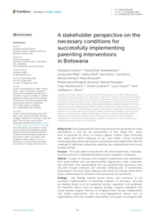Background:
Encouraging positive parenting practices through evidence-based interventions is vital for the achievement of SDG target 16.2, which aims to eradicate all forms of violence against children while promoting their safety and mental wellbeing. As low- and middle- income countries increasingly adopt parenting programs, policymakers and implementers face the challenge of efficiently transporting, adapting, and implementing them across multiple settings.
Purpose:
This study seeks to evaluate the real-world experiences, challenges, and best practices in implementing parent support programs in Botswana.
Method:
A series of interviews with program implementers and stakeholders from governmental and non-governmental organizations were conducted. Key informants from governmental and non-governmental institutions were recruited through purposive and snowball sampling and 17 practitioners participated in the study. Data collection was carried out through online Zoom video conferencing at a convenient time and location for participants.
Findings:
The findings indicate several factors that contribute to the successful implementation of parenting programs in Botswana, including (a) enabling factors such as supportive policies, regulations and guidelines, (b) innovative factors such as capacity building, program adaptation and mixed method program delivery, (c) bridging factors through collaborations with skilled organizations, and (d) intra-organizational factors such as organizational resources, program sustainability, and support for program staff.
Conclusion:
No single organization or strategy can sustainably foster positive parenting support in Botswana. Instead, a collective and collaborative learning approach is necessary to develop lasting and scalable solutions.

